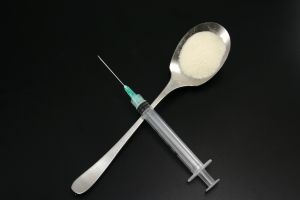 We have all heard of the term drunk driving, as DUI is one of the most common crimes in Maryland. In fact, DUI is one of the most common crimes in the entire country, as police make nearly 1.5 million DUI arrests per year in America. But what about drugged driving? Driving while under the influence of a drug such as marijuana is technically illegal in Maryland, but under Maryland law there are no definitive drug testing procedures for DUI. Under Maryland law you can be convicted of DWI with a blood alcohol concentration of .07 to .08, and for DUI with a blood alcohol concentration over .08. While these standardized numbers are somewhat arbitrary because everyone feels the effects of alcohol in different ways, the standardized numbers do provide at least the image of consistency and uniformity in DUI prosecutions. On the other hand, Maryland law does not indicate specific levels of drug concentration in the blood that would define driving while under the influence of drugs. If a police officer suspects someone is driving under the influence of drugs and not alcohol the officer can request the suspect to submit to a drug test. The question has been and will continue to be- what exactly do the results of a drug test tell us with respect to DWI?
We have all heard of the term drunk driving, as DUI is one of the most common crimes in Maryland. In fact, DUI is one of the most common crimes in the entire country, as police make nearly 1.5 million DUI arrests per year in America. But what about drugged driving? Driving while under the influence of a drug such as marijuana is technically illegal in Maryland, but under Maryland law there are no definitive drug testing procedures for DUI. Under Maryland law you can be convicted of DWI with a blood alcohol concentration of .07 to .08, and for DUI with a blood alcohol concentration over .08. While these standardized numbers are somewhat arbitrary because everyone feels the effects of alcohol in different ways, the standardized numbers do provide at least the image of consistency and uniformity in DUI prosecutions. On the other hand, Maryland law does not indicate specific levels of drug concentration in the blood that would define driving while under the influence of drugs. If a police officer suspects someone is driving under the influence of drugs and not alcohol the officer can request the suspect to submit to a drug test. The question has been and will continue to be- what exactly do the results of a drug test tell us with respect to DWI?
If a person is arrested for DWI and submits to a drug test a positive result will be used against that person in court, but that drug test really tells us very little about the person’s impairment at the time he or she was driving. Marijuana can stay in a person’s system for weeks, and thus a positive marijuana test would have little probative value in court and a huge prejudicial effect on the defendant. Even a positive cocaine test would offer little probative value in court, as cocaine can stay in the system for days. Why should a jury be entitled to see evidence that a DUI defendant tested positive for cocaine when the defendant took the cocaine 2 days prior to the DUI arrest? The same goes for prescription medications such as painkillers like oxycodone and Vicodin or anti anxiety pills like Xanax and Valium. At least one state is currently addressing this issue, as Colorado lawmakers are debating whether to pass a law that quantifies the amount of marijuana that a person can legally have in his or her blood in order to avoid a conviction for DUI.
Continue reading →
 Criminal Defense Lawyer Blog
Criminal Defense Lawyer Blog


 A routine traffic stop over the weekend led Maryland police to nearly 100 grams of heroin as well as a forged oxycodone prescription. The traffic stop took place in Annapolis and resulted in the arrest of 3 Maryland residents for various criminal offenses including drug possession, theft, and drug possession with intent to distribute. Although the traffic stop was routine, the events that followed the stop and led police to the drugs were hardly routine, and could raise multiple legal issues. Annapolis police stopped the bright green Lincoln at around 5 p.m. for an undisclosed traffic violation. The undisclosed traffic violation could be for anything from a broken taillight to failure to stop at a stop sign but chances are that the bright green car caught the eye of the Annapolis cops. As many criminal lawyers know, when a car raises red flags police typically will not wait for a traffic infraction to occur before making a traffic stop. Rather they will make the stop and then figure out a believable traffic infraction later.
A routine traffic stop over the weekend led Maryland police to nearly 100 grams of heroin as well as a forged oxycodone prescription. The traffic stop took place in Annapolis and resulted in the arrest of 3 Maryland residents for various criminal offenses including drug possession, theft, and drug possession with intent to distribute. Although the traffic stop was routine, the events that followed the stop and led police to the drugs were hardly routine, and could raise multiple legal issues. Annapolis police stopped the bright green Lincoln at around 5 p.m. for an undisclosed traffic violation. The undisclosed traffic violation could be for anything from a broken taillight to failure to stop at a stop sign but chances are that the bright green car caught the eye of the Annapolis cops. As many criminal lawyers know, when a car raises red flags police typically will not wait for a traffic infraction to occur before making a traffic stop. Rather they will make the stop and then figure out a believable traffic infraction later. The city of Washington D.C. has agreed to settle four civil lawsuits over false DUI convictions. The civil claims for damages were filed back in 2010 by 4 men whose DUI convictions were tainted by inaccurate breath alcohol testing machines. The city has agreed to pay a total of $20,000 plus attorney’s fees to the 4 plaintiffs. Two of the plaintiffs will receive $5000, and the other two will receive $8,000 and $2,000 respectively. The lawsuit alleged that city officials and police were aware that the breath alcohol testing machines were flawed, but continued to use them in criminal DUI prosecutions. As early as 2008 an independent expert informed the city that their breath alcohol machines were not providing accurate results for a variety of reasons. The machines used in D.C. are similar to the Intoxilyzer machines used in Maryland, and require regular maintenance and calibration. D.C. officials failed to do either, but that does not even tell half the story of the city’s dishonest and fraudulent behavior.
The city of Washington D.C. has agreed to settle four civil lawsuits over false DUI convictions. The civil claims for damages were filed back in 2010 by 4 men whose DUI convictions were tainted by inaccurate breath alcohol testing machines. The city has agreed to pay a total of $20,000 plus attorney’s fees to the 4 plaintiffs. Two of the plaintiffs will receive $5000, and the other two will receive $8,000 and $2,000 respectively. The lawsuit alleged that city officials and police were aware that the breath alcohol testing machines were flawed, but continued to use them in criminal DUI prosecutions. As early as 2008 an independent expert informed the city that their breath alcohol machines were not providing accurate results for a variety of reasons. The machines used in D.C. are similar to the Intoxilyzer machines used in Maryland, and require regular maintenance and calibration. D.C. officials failed to do either, but that does not even tell half the story of the city’s dishonest and fraudulent behavior.  On Sunday night in Washington D.C., Nationals 19 year old baseball phenom Bryce Harper came up to bat in the bottom of the first inning. Veteran Phllies pitcher, Cole Hamels then proceeded to throw his first pitch directly at the lower back of Harper. Harper bent over in obvious pain for a few seconds, trotted off to first base, and then scored the first run of the game a few pitches later. After the game, the veteran pitcher admitted that he purposely threw the pitch in Harper’s direction, and fully intended to hit him. Hamels stated that throwing at Harper was his way of welcoming the rookie sensation to the major leagues. The commissioner of baseball however was not impressed with Hamels’ actions nor his honesty, and suspended the pitcher for 5 games.
On Sunday night in Washington D.C., Nationals 19 year old baseball phenom Bryce Harper came up to bat in the bottom of the first inning. Veteran Phllies pitcher, Cole Hamels then proceeded to throw his first pitch directly at the lower back of Harper. Harper bent over in obvious pain for a few seconds, trotted off to first base, and then scored the first run of the game a few pitches later. After the game, the veteran pitcher admitted that he purposely threw the pitch in Harper’s direction, and fully intended to hit him. Hamels stated that throwing at Harper was his way of welcoming the rookie sensation to the major leagues. The commissioner of baseball however was not impressed with Hamels’ actions nor his honesty, and suspended the pitcher for 5 games.  The Maryland Legislature recently passed a bill that will lower the maximum penalty for possession of marijuana from 1 year in jail to 90 days in jail. Maximum fines for marijuana possession will also drop from $1000 to $500. The bill was signed into law by Governor O’Malley and will go into effect in October of 2012. The Maryland marijuana bill only applies to simple possession of less than 10 grams of the plant, a compromise between the two legislative chambers. The Maryland Senate wanted the new bill to apply to possession of any amount less than 14 grams of marijuana, or one half ounce, but the Maryland House wanted reduced punishments only for less than 7 grams, or one quarter ounce of marijuana. The Maryland law makers eventually agreed on the 10 gram limit, and the bill easily passed both chambers by a vote of 41-5 in the Senate, and 92-31 in the House.
The Maryland Legislature recently passed a bill that will lower the maximum penalty for possession of marijuana from 1 year in jail to 90 days in jail. Maximum fines for marijuana possession will also drop from $1000 to $500. The bill was signed into law by Governor O’Malley and will go into effect in October of 2012. The Maryland marijuana bill only applies to simple possession of less than 10 grams of the plant, a compromise between the two legislative chambers. The Maryland Senate wanted the new bill to apply to possession of any amount less than 14 grams of marijuana, or one half ounce, but the Maryland House wanted reduced punishments only for less than 7 grams, or one quarter ounce of marijuana. The Maryland law makers eventually agreed on the 10 gram limit, and the bill easily passed both chambers by a vote of 41-5 in the Senate, and 92-31 in the House. The Baltimore Police department has not been meeting the terms of a settlement regarding illegal arrests according to the ACLU. The settlement arose out of a 2006 lawsuit, which alleged a pattern of thousands of unlawful arrests for various non violent, low level crimes such as drug possession, trespassing, and loitering in Baltimore City. The civil lawsuit was filed by the ACLU on behalf of 14 people that were arrested in Baltimore without probable cause. The lawsuit stated that due to Baltimore City’s zero tolerance policy, Baltimore police officers began unlawfully arresting people on the street at an alarming rate.
The Baltimore Police department has not been meeting the terms of a settlement regarding illegal arrests according to the ACLU. The settlement arose out of a 2006 lawsuit, which alleged a pattern of thousands of unlawful arrests for various non violent, low level crimes such as drug possession, trespassing, and loitering in Baltimore City. The civil lawsuit was filed by the ACLU on behalf of 14 people that were arrested in Baltimore without probable cause. The lawsuit stated that due to Baltimore City’s zero tolerance policy, Baltimore police officers began unlawfully arresting people on the street at an alarming rate.  A recent Maryland Court of Appeals decision has declared that it is an unconstitutional invasion of privacy for police officers to obtain DNA samples from arrested individuals absent a criminal conviction. It has previously been the standard practice of the Maryland State Police and other police departments around the state to obtain DNA samples from any suspect charged with burglary, and certain violent crimes such as assault, rape, homicide, and aggravated assault. Under the recent ruling, Maryland police departments must now wait until prosecuting lawyers secure a criminal conviction before they can legally obtain DNA samples from a defendant. The ruling by the Maryland Court of Appeals overturned the 2009 rape conviction of Alonzo Jay King Jr. when the court concluded that DNA samples that led to King’s rape conviction were the fruits of an illegal seizure pursuant to the Fourth Amendment of the U.S. Constitution. King’s DNA sample was obtained after he was arrested for an unrelated assault case. The high court ruling has had an immediate impact upon law enforcement, as the Maryland state police department, headquartered in Pikesville, Maryland, has already instructed its employees to suspend DNA sampling of arrested suspects.
A recent Maryland Court of Appeals decision has declared that it is an unconstitutional invasion of privacy for police officers to obtain DNA samples from arrested individuals absent a criminal conviction. It has previously been the standard practice of the Maryland State Police and other police departments around the state to obtain DNA samples from any suspect charged with burglary, and certain violent crimes such as assault, rape, homicide, and aggravated assault. Under the recent ruling, Maryland police departments must now wait until prosecuting lawyers secure a criminal conviction before they can legally obtain DNA samples from a defendant. The ruling by the Maryland Court of Appeals overturned the 2009 rape conviction of Alonzo Jay King Jr. when the court concluded that DNA samples that led to King’s rape conviction were the fruits of an illegal seizure pursuant to the Fourth Amendment of the U.S. Constitution. King’s DNA sample was obtained after he was arrested for an unrelated assault case. The high court ruling has had an immediate impact upon law enforcement, as the Maryland state police department, headquartered in Pikesville, Maryland, has already instructed its employees to suspend DNA sampling of arrested suspects. Baltimore County Police have identified the main suspect in a string of recent Baltimore area burglaries. The burglaries have resulted in the theft of valuable items such as electronic office equipment, black checks, food, office supplies, postage stamps and money. The main suspect is apparently a 48 year old man from Baltimore that has also been implicated in other burglaries throughout Maryland. The recent Baltimore burglaries occurred on or about April 3 and included the breaking and entering of two medical offices. The first office was a podiatry center and the second burglarized office was a medical office used for testing and treatment of hearing disorders. Both offices used and stored valuable medical equipment.
Baltimore County Police have identified the main suspect in a string of recent Baltimore area burglaries. The burglaries have resulted in the theft of valuable items such as electronic office equipment, black checks, food, office supplies, postage stamps and money. The main suspect is apparently a 48 year old man from Baltimore that has also been implicated in other burglaries throughout Maryland. The recent Baltimore burglaries occurred on or about April 3 and included the breaking and entering of two medical offices. The first office was a podiatry center and the second burglarized office was a medical office used for testing and treatment of hearing disorders. Both offices used and stored valuable medical equipment. A Maryland man was recently arrested for selling marijuana and other drugs from his ice cream truck according to police in Charles County. The alleged Maryland drug dealer was arrested based on a tip from Crime Solvers. The tip apparently informed police that the 20 year old man had been illegally selling packets of marijuana while at the same time legally selling frozen treats in southern Maryland neighborhoods. Police responded to the tip and sent a investigative unit to attempt to observe the ice cream drug dealer in action. Police investigative units apparently were not able to catch the Maryland man actually performing a hand to hand transaction with a would be marijuana buyer, but they were able to secure an arrest with the help of a canine police unit.
A Maryland man was recently arrested for selling marijuana and other drugs from his ice cream truck according to police in Charles County. The alleged Maryland drug dealer was arrested based on a tip from Crime Solvers. The tip apparently informed police that the 20 year old man had been illegally selling packets of marijuana while at the same time legally selling frozen treats in southern Maryland neighborhoods. Police responded to the tip and sent a investigative unit to attempt to observe the ice cream drug dealer in action. Police investigative units apparently were not able to catch the Maryland man actually performing a hand to hand transaction with a would be marijuana buyer, but they were able to secure an arrest with the help of a canine police unit.